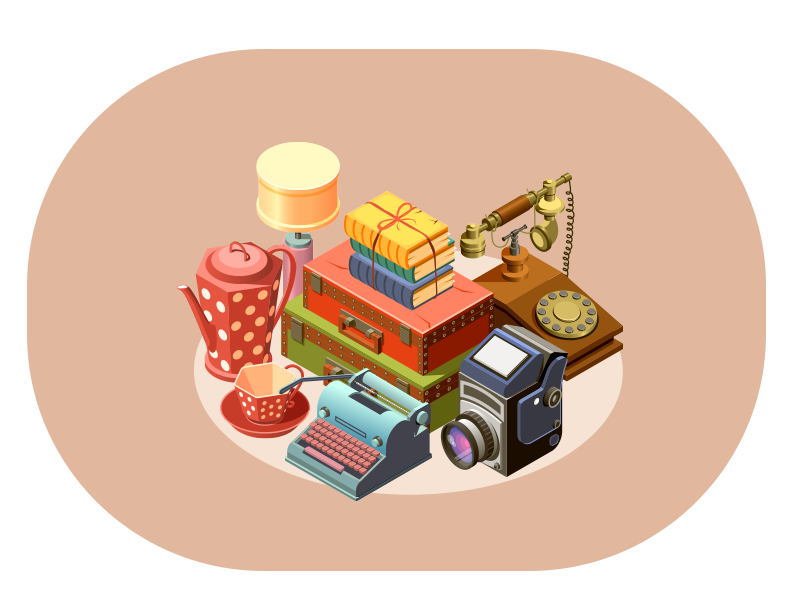Why Do I Have Difficulty Letting Go of My Belongings?

Should I Be Concerned About My Emotional Attachment to Things
The fact you want to hold onto or collect certain things is not itself a problem. It only becomes a problem if the need to gather and hold onto stuff is driven by an obsession. That kind of obsession is often a clear sign of hoarding disorder.
Before you burden yourself with worry, might we suggest that you think about why you are collecting things? If you are doing this in hopes of profiting in the future, that’s a reasonable endeavor. If you are doing it simply because it gives you pleasure, there is nothing wrong with that as well.
Where and when you should be concerned is if the need to be attached to stuff seems to not be supported by rhyme or reason. If you don’t know why you are obsessively doing something that might seem odd to you or others, that’s when concern should enter your mind. Please keep in mind that everyone has different attachment styles.
In the following paragraphs, we’ll seek to educate about hoarding disorder. We hope that providing you with good and useful information will help you better understand your emotional attachments to objects and further motivate you to take action if you feel it’s necessary.
11+ Years Experience dealing with Hoarding
u003cp class=u0022cta-info__headingu0022u003eNeed someone to talk to that understands hoarding?u003c/pu003ernGet a Free Hoarding Clean-up Estimate.rnOr call us today for immediate assistance.
What is an Emotional Attachment to Objects?

We all have things in our lives that we carry with us in our hearts. It might be that teddy bear sitting on your bed or that 67 Mustang that’s been parked in the garage for years. There is nothing wrong with valuing something from the past in the future. It’s normal.
An emotional attachment to objects can best be defined as the need to keep something around that fulfills some type of emotional need. Keeping in mind that attachment styles differ, the emotional need could involve creating a sense of security or something as simple as appealing to something sentiment from our past. It might even be something you do because others identify you by it. It’s like the fella who is recognized as the guy around town who collects and wears baseball caps.
What is Hoarding Disorder

Hoarding disorder is a mental health condition that drives a person to save a large number of items. In most cases, it will be one specific item though some hoarders might end up saving other items that are closely related to their primary hoarding target. Furthermore, they collect items seemingly without rhyme or reason. For further clarification, hoarding disorder is classified along a spectrum of obsessive-compulsive disorders.
The types of items that they have an emotional attachment to objects seem to be popular among people who hoard are beer cans, newspapers/magazines, clothes, canned goods, household items, and yes, pets. It’s also reasonable to state that most items that get hoarded don’t have any value beyond what they offer in value to the person saving such items.
The Sure Signs of Hoarding Disorder

While collecting and emotional attachments to objects are usually harmless parts of being, there is a line too far. That line would be the crossing over into hoarding disorder, which was defined above.
How do you know if you are heading for or caught up in hoarding disorder? Here are some of the key signs or symptoms:
- Inability to let go of or discard certain items
- Experience of emotional attachment to objects can lead to
stress and anxiety at the thought of getting rid of the hoarded item - Fear the hoarded item might be needed in the future
- Lack of organizational skills and organized thinking
- Willingness to live in messes created by clutter
- Creation of fire hazards due clutter
- Problems in the home with pest control
- No social interactions because of avoidance by family and friends
- Legal problems with landlord and homeowner associations
- Personality traits include being prone to procrastination and being easily distracted
It’s noteworthy that folks suffering from hoarding disorder will have their attachment styles. They have very specific ways and places they will keep their items as the pile grows.
The Causes of Hoarding
The reasons why people fall victim to hoarding are often born out of their psychology, which has developed over the years. With that in mind, here are some of the reasons why hoarding might become a reality:
- Learned behavior during childhood
- Certain types of abuse
- Childhood trauma caused by the lack of belongings while growing up
- Continual problems with problem-solving, organizing, and planning
- Memory issues
Hoarding Help is Available
Most people caught up in hoarding are unaware that what they are doing is unusual. It will seem perfectly normal to be collecting what they are collecting because they feel they need the items. It’s only when someone speaks up or the symptoms reach the boiling point that hoarding victims will realize something is amiss.
There is very good news here. There is plenty of help available for hoarding disorder victims. While the disorder is not likely to diminish on its own, therapists are having wonderful results in the treatment of hoarding disorder.
A psychiatrist might want to start the treatment process with antidepressants. These selective serotonin reuptake inhibitors (SSRIs) work by soothing the brain’s need for compulsive or obsessive behavior.
For the folks who aren’t big medication fans, Cognitive behavioral therapy (CBT) is a good therapeutic option. With this type of therapy, the client is taught to recognize how their negative thoughts are driving their hoarding behavior. They are then taught how to replace those negative thoughts with positive thoughts, which will hopefully diminish the need to hoard.
The secret sauce that’s needed for healing is recognition. As long as the hoarding disorder victim is able to recognize the problem, that will likely be followed by their desire to fix the problem.
How Clutter Trucker Can Help Hoarders
As a professional junk removal service, Clutter Trucker has plenty of experience in dealing with customers who are hoarders or are relatives of hoarders. We are proud of the fact our employees have been trained in the understanding of hoarders. They are also sympathetic people who have a great desire to be helping hoarders in any way possible.
For starters, we are available to come in and remove hoarded items. We can follow that up with our hoarding cleaning services, specifically cleaning areas where hoarded items have been stored.
Beyond junk removal and cleaning, we are proud to offer one more value-added service. We can advise and make recommendations as to where a hoarding disorder victim can get help. We find this service much appreciated by people who are ready to get help but aren’t sure where to go.
If you or a loved one need help dealing with the remnants of hoarding disorder, call Clutter Trucker. We’ll have your back.

About Jennifer Hanzlick
Clutter Trucker is a Denver-based hoarding clean-out company founded by Jennifer Hanzlick. Jennifer leveraged 15 years of corporate experience in to start the company in 2008. Her mission is to help and educate individuals and their loved ones who have hoarding disorder. A featured speaker at Ted X Boulder, Jennifer works directly with community and non-profit organizations to boost public awareness about the condition. To that end, she founded the Colorado Hoarding Task Force in 2015.
 720-982-7856
720-982-7856







